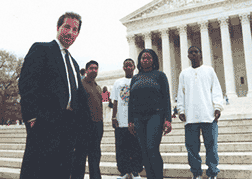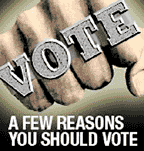|
|
 |
||||||
|
|||||||
Ought There to be a Law?
Will wrangling 16-year-olds to register round up herds of young voters?by Carrie MadrenGov. Martin O’Malley strips to a T-shirt to play electric guitar in his band. Candidates reach out to young voters on My Space. But future candidates might need an even hipper image, perhaps candidate comic books or an ultra-mod fashion code, to get elected. For if Maryland decides to lower the voting registration age to 16, the 2008 election might draw more young voters. The idea, says Senate Bill 31’s sponsor Democratic Sen. Jamie Raskin, is to “capture them while they’re still in school,” where teachers and other leaders can help explain what it means to vote. After they leave school, he says, the student’s probability of registering and voting decreases. The 44-year-old recruited dozens of high school volunteers to help send him to the Senate last year, promising them that he would push such a law to allow them and their peers the right to register. Sen. Raskin has reason to believe that his change would get more 18-year-olds to take advantage of their right to vote. “Young people who are registered to vote, [do] vote,” says Hans Riemer of Rock the Vote, an organization that involves young people in politics, registers them to vote and provides tools to connect with their community. “The hard part is getting them to register.” The bill would help, Riemer says, because potential voters often find our present sign-up system “complicated, bureaucratic and the rules are somewhat complex.” Red tape keeps people — especially young people — away from the polls. Registration at 16 would also link voting to getting a driver’s license, the rite of passage. “It certainly makes sense to have young people register when they get their driver’s license,” says Kathleen Watters, University of Dayton professor of communication who specializes in political socialization, “We know that registration is one barrier to voting. Pairing it with getting a driver’s license sends the message that now you’re engaging in adult behavior.” Though it stands to reason that more young registered Marylanders would go to the polls, Watters doesn’t know whether the link will hold. Nor is the idea a winner to 16-year-old Alex Murray of Severna Park and former Bay Weekly intern. “At 16, we are still minors and do not have control regarding where we live,” Murray writes in an email. “In my case, I would register in Maryland, move away to college [out of state] and have to re-register all over again in another state. Since I can’t vote before I turn 18, there would be no point in registering in Maryland.” For all ages, our voting record isn’t bright. Of some 3,142,551 registered voters in Maryland, only 1,800,045 voted in the 2006 gubernatorial election. On the other hand, Riemer argues that young people vote in much higher numbers than the general population. Some 80 percent of registered 18- to 29-year-olds actually voted, he told the Senate’s Education, Health and Environmental Affairs Committee. After the committee hearing, legislators decided to study the bill further between this session’s end in April and next session, beginning January, 2008. Which means they’ve lost the chance to get quick feedback on this legislation. Maryland holds its next statewide election, a presidential primary in March, 2008, when the quarter of high schoolers who turn 18 during senior year can vote — if they’ve registered. |
|||||||
|
|
|||||||
|
© COPYRIGHT 2007 by New Bay Enterprises, Inc. All rights reserved. |


